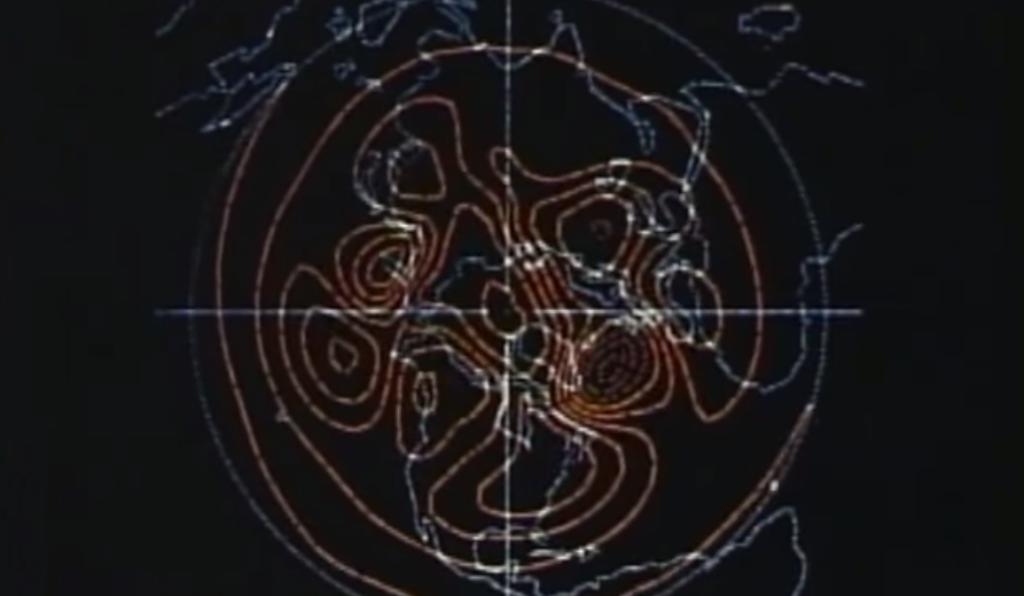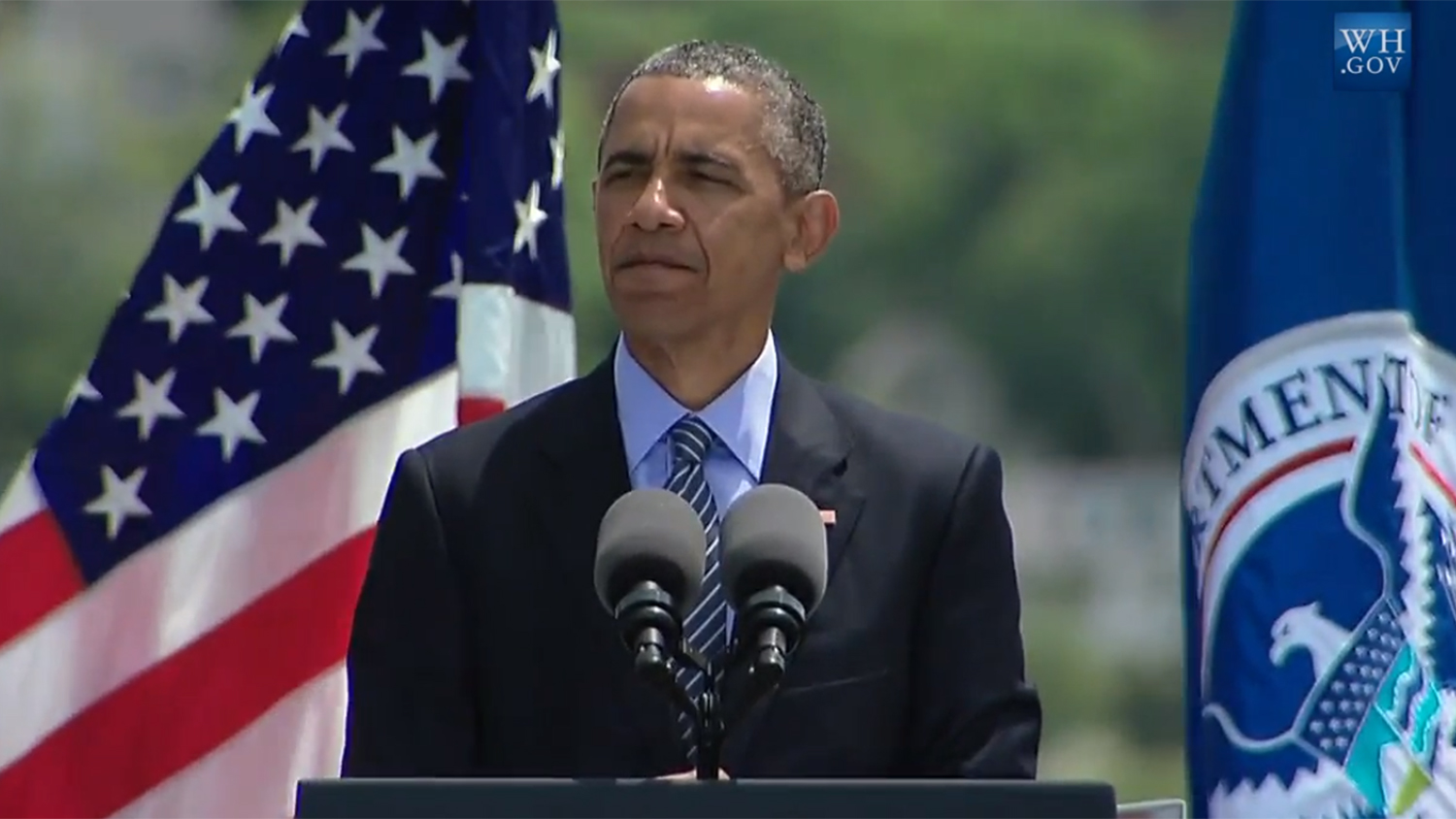President Barack Obama had a strong message for graduates of the Coast Guard Academy in Connecticut on Wednesday, and all the rest of us too: Global warming is a major security threat.
During a commencement address at the academy, he linked changes in the climate to volatility and violence in the Middle East, and warned that global warming to undermine military readiness. He said military forces must adapt and prepare for the kinds of changes we’re already starting to see, but “such preparation and adaptation alone will not be enough. … the only way the world is going to prevent the worst effects of climate change is to slow down the warming of the planet.”
Here’s more from the speech:
I’m here today to say that climate change constitutes a serious threat to global security, an immediate risk to our national security. And make no mistake, it will impact how our military defends our country. And so we need to act — and we need to act now.
After all, isn’t that the true hallmark of leadership? When you’re on deck, standing your watch, you stay vigilant. You plan for every contingency. And if you see storm clouds gathering, or dangerous shoals ahead, you don’t sit back and do nothing. You take action — to protect your ship, to keep your crew safe. Anything less is negligence. It is a dereliction of duty. And so, too, with climate change. Denying it, or refusing to deal with it endangers our national security. It undermines the readiness of our forces. …
[Y]ou are part of the first generation of officers to begin your service in a world where the effects of climate change are so clearly upon us. It will shape how every one of our services plan, operate, train, equip, and protect their infrastructure, their capabilities, today and for the long term. …
Around the world, climate change increases the risk of instability and conflict. Rising seas are already swallowing low-lying lands, from Bangladesh to Pacific islands, forcing people from their homes. Caribbean islands and Central American coasts are vulnerable, as well. Globally, we could see a rise in climate change refugees. And I guarantee you the Coast Guard will have to respond. Elsewhere, more intense droughts will exacerbate shortages of water and food, increase competition for resources, and create the potential for mass migrations and new tensions. All of which is why the Pentagon calls climate change a “threat multiplier.”
Understand, climate change did not cause the conflicts we see around the world. Yet what we also know is that severe drought helped to create the instability in Nigeria that was exploited by the terrorist group Boko Haram. It’s now believed that drought and crop failures and high food prices helped fuel the early unrest in Syria, which descended into civil war in the heart of the Middle East.
And it’s not just abroad, of course — climate change threatens our security right at home, Obama stressed:
Climate change, and especially rising seas, is a threat to our homeland security, our economic infrastructure, the safety and health of the American people. Already, today, in Miami and Charleston, streets now flood at high tide. Along our coasts, thousands of miles of highways and roads, railways, energy facilities are all vulnerable. It’s estimated that a further increase in sea level of just one foot by the end of this century could cost our nation $200 billion. …
Climate change poses a threat to the readiness of our forces. Many of our military installations are on the coast, including, of course, our Coast Guard stations. Around Norfolk, high tides and storms increasingly flood parts of our Navy base and an airbase. In Alaska, thawing permafrost is damaging military facilities. …
So politicians who say they care about military readiness ought to care about this, as well.
Obama mocked those politicians who try to dodge the topic with the “I’m not a scientist” line, as he’s done before. “Well, I’m not either,” Obama said. “But the best scientists in the world know that climate change is happening. Our analysts in the intelligence community know climate change is happening. Our military leaders — generals and admirals, active duty and retired — know it’s happening. Our homeland security professionals know it is happening. And our Coast Guard knows it’s happening. The science is indisputable.”
The White House released a report on this same topic on Wednesday, “The National Security Implications of a Changing Climate,” which rounds up findings from other federal and military reports. A snippet:
The national security implications of climate change impacts are far-reaching, as they may exacerbate existing stressors, contributing to poverty, environmental degradation, and political instability, providing enabling environments for terrorist activity abroad. For example, the impacts of climate change on key economic sectors, such as agriculture and water, can have profound effects on food security, posing threats to overall stability.
Wednesday’s commencement address was just the latest climate commentary from the president: Obama has been saying lots of smart stuff about climate change lately. And he has stressed the security angle previously, as in his State of the Union speech this year, when he said, “The Pentagon says that climate change poses immediate risks to our national security. We should act like it.”
Obama is using his bully pulpit to emphasize the importance of climate change to the general populace. Greg Sargent of The Washington Post points out that he’s also using it to inject climate change into the ongoing presidential race:
President Obama can help ensure that climate change plays a larger role in the 2016 election simply by talking about the issue, thus elevating its profile and making it more likely that the GOP contenders will loudly oppose whatever he is proposing. …
[M]illennials and socially liberal college educated whites in particular might be drawn to the argument (which you’ll hear a lot more of soon enough) that on climate, Republicans remain the party of the past — hostile to science and international engagement in the face of looming future challenges.
That could give a boost to Hillary Clinton, who gave a speech of her own connecting climate and energy to national security in 2012.



